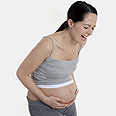
Study: 1 in 4 women traumatized by childbirth
Israeli scientists find that 26% of women suffer symptoms of posttraumatic stress after having a child – including nightmares and anxiety
It is common knowledge that many women suffer from depression immediately after having a child, but giving birth could be far more emotionally damaging than it was ever before known to be, a new study finds.
According to the study, one in four women suffers from posttraumatic stress after labor.
Related articles:
- Report: Israel 45th best place for moms Committee to endorse surrogacy for gays Number of IVF births doubles within decade
Mental health professionals have been in disagreement in recent years whether childbirth can be defined as a traumatic experience. Past research found that some mothers report feeling their bodies being torn apart or irreparably damaged during labor.
In an effort to look into the issue in Israel, scientists at the Beer Yaakov Mental Health Center, the Sheba Medical Center and Tel Aviv University's Faculty of Medicine developed a questionnaire aimed at determining how traumatizing childbirth is. Eighty-nine women aged 20-40 answered the survey and were monitored for a month after having their child. Standardized scales used to measure posttraumatic stress were employed.
The analysis found that a month after giving birth, 26% of the mothers suffered to some extent from symptoms typical of posttraumatic stress disorder.
The women had nightmares about childbirth, reacted with anxiety when the ordeal was mentioned and made efforts not to think or talk about it – so much so that they avoided attending follow-up appointments with the doctor. The women experienced restlessness and outbursts of anger, felt overexcited and nervous, and thought about never having children again.
Fear for their lives
According to the study, 80% of women who suffered from the disorder reported experiencing complications or an emotional breakdown during pregnancy. They reported feeling extremely uncomfortable to be naked during labor, and being scared to give birth. These women were less likely to receive an epidural, and therefore reported higher levels of pain.
Moreover, 71% of the traumatized mothers said they feared for their lives and their health while giving birth, and 40% said they feared for the lives of their babies.
The researchers further found that women who breastfed their infants immediately after giving birth were at lower risk of suffering from posttraumatic stress.
No connection was found between the incidence of the disorder and the mothers' socioeconomic background, number of previous births, region of residency and level of education.
Furthermore, no significant difference was found between the traumatized and non-traumatized women in the level of support they received during labor, the health problems found in the baby or the Apgar scores they were given.
"Even though this is a common and natural experience, labor can have long-term emotional consequences," said Dr. Inbal Shlomi-Polchek, a psychiatry expert who led the research. "(…) In the study we identified risk factors that could affect the development of posttraumatic stress, and these should be addressed during labor and after it, or perhaps be prevented altogether."
- Receive Ynetnews updates directly to your desktop










